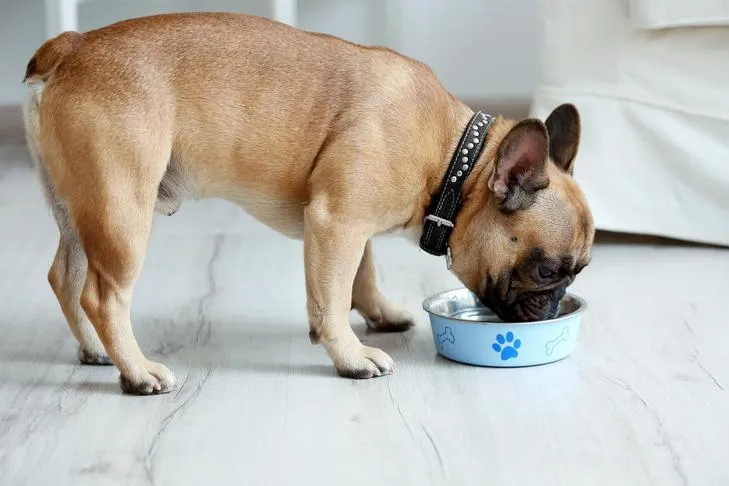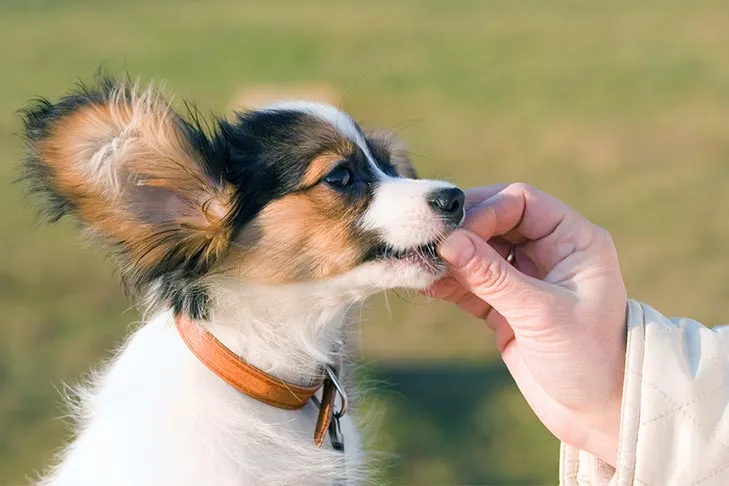As a loving dog owner, you’ve probably found yourself wondering, “Hey Google, what can dogs eat?” when your furry friend gazes longingly at your plate. It’s a common dilemma, as many human foods are perfectly safe and even beneficial for our canine companions, while others can be incredibly dangerous. Understanding which foods are safe and in what quantities is crucial for maintaining your dog’s health and happiness. This comprehensive guide, from the experts at Dog Care Story, will walk you through common human foods that your dog can enjoy and those they should absolutely avoid, helping you make informed decisions about their diet and ensuring they stay healthy and safe.
Safe Human Foods Your Dog Can Enjoy
Many household staples can be safely shared with your dog, often providing additional nutrients or simply serving as a delightful treat. However, moderation is key, and preparation is crucial to ensure these foods are safe and digestible for your pet. Always introduce new foods slowly and in small amounts to monitor for any adverse reactions.
Bread
Small quantities of plain bread are generally safe for your dog, provided it is free from spices, especially garlic or onion, and absolutely no raisins. While bread doesn’t offer significant nutritional benefits and is high in carbohydrates and calories, a small, occasional piece won’t cause harm. Homemade breads are often a better option than store-bought varieties, which frequently contain unnecessary preservatives. However, it’s best to consider bread as an occasional treat rather than a dietary staple.
Cashews
Cashews can be a suitable treat for dogs, but only in very limited amounts. They contain beneficial nutrients like calcium, magnesium, antioxidants, and proteins. Nevertheless, despite having less fat than some other nuts, consuming too many cashews can contribute to weight gain. When offering cashews, ensure they are unsalted to avoid excessive sodium intake, which is not good for your dog’s health.
Cheese
Cheese can be a wonderful, high-value treat for dogs when given in small to moderate quantities. Most dogs tolerate lactose well, but some can be lactose intolerant, so observe your dog after the first small serving. Due to its often high-fat content, opting for lower-fat varieties such such as cottage cheese or mozzarella is a healthier choice. Many dogs also enjoy specialized, dog-friendly dried cheese chews, like Himalayan dog chews. Always remember that cheese should be an occasional treat due to its caloric density.
 All American Dog resting its head on the kitchen table looking at cheese.
All American Dog resting its head on the kitchen table looking at cheese.
Coconut
This versatile fruit offers several health benefits for dogs. Coconut contains lauric acid, which is known for its ability to combat various bacteria and viruses, potentially boosting your dog’s immune system. Additionally, coconut can aid in improving bad breath and may help alleviate certain skin conditions, including hot spots, flea allergies, and general itchy skin. Both coconut milk and coconut oil are safe for canine consumption. However, it is vital to keep the fibrous outer shell away from your dog, as pieces can become lodged in their throat, posing a serious choking hazard.
Corn
Corn is a surprisingly common ingredient found in many commercial dog foods, serving as a good source of carbohydrates, fiber, and essential fatty acids. While the kernels are safe for dogs, the cob itself presents a significant danger. Corn cobs are difficult for dogs to digest and can lead to an intestinal blockage, which often requires emergency veterinary intervention. If you wish to share corn with your dog, always ensure it is removed from the cob. For a safer alternative, consider a squeaky corn-shaped toy.
Eggs
Cooked eggs are an excellent and safe source of protein for dogs. They are packed with amino acids and essential vitamins, making them a nutritious addition to your dog’s diet, especially when they have an upset stomach. However, it is crucial that eggs are fully cooked before serving. Raw egg whites contain avidin, an enzyme that can interfere with biotin absorption, potentially leading to a biotin deficiency over time. Always cook eggs thoroughly, whether scrambled, boiled, or poached, to eliminate this risk.
Fish
Fish can be a highly beneficial addition to your dog’s diet, providing healthy fats and amino acids that contribute to their overall well-being. Salmon and sardines are particularly advantageous. Salmon is rich in vitamins, protein, and Omega-3 fatty acids, which support joint and brain health. Sardines offer similar benefits and have soft, digestible bones that provide extra calcium. With the exception of sardines, which have very small, soft bones, it is absolutely essential to carefully remove all tiny bones from other types of fish before feeding them to your dog, as they can cause choking or internal injury. Never feed your dog uncooked or undercooked fish, as it may contain parasites that can cause severe illness. Limit fish intake to no more than twice a week.
Ham
While ham is generally considered safe for dogs to eat, it is certainly not the healthiest option. It is typically high in both sodium and fat, which can be detrimental to a dog’s health if consumed regularly. A very small, plain piece of ham as an occasional treat is acceptable, but it should not become a consistent part of their diet. Excessive fat can lead to pancreatitis, and high sodium intake can cause other health issues. Always opt for lean, unseasoned pieces if you choose to offer it.
 French Bulldog eating from a bowl at home.
French Bulldog eating from a bowl at home.
Honey
Honey is a natural powerhouse of nutrients, containing vitamin A, potassium, calcium, magnesium, copper, and a wealth of antioxidants. Feeding small amounts of local honey to dogs can potentially aid in mitigating seasonal allergies by gradually introducing small amounts of pollen, thereby building up immunity to local allergens. Beyond dietary intake, honey’s natural antibacterial properties make it a beneficial topical treatment for minor burns and superficial cuts on your dog’s skin, assisting in the healing process.
Milk
Dogs can drink milk, but caution is advised. While a small amount is generally fine, some dogs are lactose-intolerant and may experience digestive upset such as diarrhea or gas. The severity of lactose intolerance varies between individual dogs. It’s advisable to observe your dog closely after offering milk for the first time. If you notice any signs of discomfort, it’s best to stick to water for hydration. For puppies, specialized puppy formula is recommended instead of cow’s milk.
Peanut Butter
Peanut butter is an excellent source of protein, heart-healthy fats, and essential vitamins like B and E, as well as niacin, making it a popular and nutritious treat for dogs. The healthiest option is raw, unsalted peanut butter. However, it is critically important to read the label carefully and ensure the peanut butter does not contain xylitol. Xylitol is a sugar substitute that is highly toxic to dogs, even in small amounts, and can cause a rapid drop in blood sugar, liver failure, or even death. Always choose xylitol-free peanut butter.
Peanuts
Unlike almonds, which can be difficult for dogs to digest, plain peanuts are safe for dogs to eat. They are rich in healthy fats and proteins that can contribute to your dog’s overall health. As with all high-fat foods, moderation is key to prevent your dog from consuming too much fat, which could lead to pancreatitis or weight gain. Additionally, always opt for unsalted peanuts, as excessive salt intake can be hard on a dog’s kidneys and overall system.
Popcorn
Unsalted, unbuttered, and air-popped popcorn can be a safe and enjoyable treat for your dog in moderation. It contains riboflavin and thiamine, which support eye health and aid digestion, along with small amounts of iron and protein. The most important consideration is to ensure that all kernels are fully popped, as unpopped kernels pose a significant choking hazard and can cause dental damage. Avoid microwave popcorn or any varieties with added butter, salt, or artificial flavors, as these ingredients are unhealthy for dogs.
Pork
Pork is a highly digestible protein that is rich in amino acids, making it a good dietary component for dogs. While it generally contains more calories per pound compared to some other meats, it can be a valuable source of energy. Interestingly, pork may also be less likely to cause an allergic reaction in some sensitive pets compared to more common proteins like chicken or beef. When preparing pork for your dog, ensure it is fully cooked and all excess fat and bones are removed. Unseasoned, lean pork is the best choice.
Quinoa
Quinoa, a complete protein and a highly nutritious pseudocereal, is increasingly found in high-quality dry dog foods. Its robust nutritional profile makes it a healthy and superior alternative to common starches like corn, wheat, and soy, which are often used as fillers in kibble. Quinoa provides essential amino acids, fiber, and various minerals, contributing to a balanced diet for your dog. When serving, ensure it is cooked plain without any added seasonings.
 Samoyed puppy laying in the grass outdoors.
Samoyed puppy laying in the grass outdoors.
Salmon
As mentioned previously, fully cooked salmon is an outstanding source of protein, healthy fats, and amino acids. It actively promotes strong joint health, supports cognitive function, and provides a significant boost to your dog’s immune system thanks to its rich Omega-3 fatty acid content. However, raw or undercooked salmon poses a severe risk to dogs because it can contain harmful parasites that cause “salmon poisoning disease.” Symptoms can include vomiting, diarrhea, dehydration, and in extreme cases, it can be fatal. It is absolutely crucial to cook salmon thoroughly to eliminate these parasites before offering it to your dog.
Shrimp
A few shrimp every now and then can be a fine treat for your dog, provided they are fully cooked and completely shelled. This includes removing the tail, head, and legs, as these parts can be difficult to digest or pose a choking risk. Shrimp are an excellent source of antioxidants, vitamin B-12, and phosphorus, while being naturally low in fat, calories, and carbohydrates, making them a healthy, lean protein option.
Tuna
Dogs can eat tuna, but only in very small, infrequent amounts. When given in moderation, cooked, fresh tuna is an excellent source of omega-3 fatty acids, which are vital for promoting heart health and supporting good vision. However, caution is advised with canned tuna due to its potential mercury content and often higher sodium levels. If you do offer canned tuna, choose varieties packed in water (not oil) and ensure it contains no added spices, especially onion or garlic powder, which are toxic to dogs. Due to the mercury risk, fresh, cooked tuna is generally preferred.
Turkey
Turkey is a safe and lean protein source for dogs, often found in commercial dog foods. When sharing turkey with your pet, it is essential to remove all excess fat and skin, as these can be difficult to digest and contribute to pancreatitis. More importantly, always meticulously check for and remove all bones. Cooked poultry bones can easily splinter during digestion, leading to internal blockages, perforations, or tears in the intestines, which are life-threatening conditions. Furthermore, never feed your dog turkey that has been seasoned with excessive salt, onions, garlic, or other strong spices, as these are harmful.
Wheat or Grains
Contrary to popular belief fueled by some marketing trends, dogs do not inherently need a grain-free diet. In fact, grains like wheat and corn are often excellent sources of essential nutrients for dogs, providing protein, vital fatty acids, and dietary fiber. Unless your dog has a veterinarian-diagnosed grain allergy or sensitivity, there is no medical reason to avoid grains. If you suspect your dog has specific allergies, consult your veterinarian for personalized dietary recommendations.
Yogurt
Plain yogurt can be a perfectly acceptable and beneficial snack for dogs, especially varieties containing live and active cultures. These probiotics can help strengthen your dog’s digestive system and support gut health. However, some dogs may have trouble digesting dairy products, similar to milk. If your dog tolerates it well, plain, unsweetened yogurt is the best choice. Always avoid any yogurts with added sugar, artificial sweeteners (especially xylitol), or fruit flavorings, as these can be unhealthy or even toxic.
 Papillon puppy gently taking a treat from a hand.
Papillon puppy gently taking a treat from a hand.
Human Foods Your Dog Should Never Eat
Beyond the safe options, it is absolutely essential for every dog owner to be aware of human foods that are dangerous or toxic to dogs. Some of these can cause mild digestive upset, while others can lead to severe illness, organ damage, or even death. Always keep these foods completely out of your dog’s reach. If you ever suspect your dog has ingested something toxic, contact your veterinarian or an emergency animal hospital immediately. This includes common items like chocolate, grapes and raisins, onions, garlic, avocado, macadamia nuts, xylitol, and alcohol, among others. Prioritizing food safety is paramount to protecting your beloved companion.
